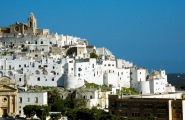- You are here
- Puglia
- Puglia Travel Guide
- Pentecost in Apulia
Pentecost in Apulia
Take advantage of Pentecost week for a break in Apulia!!
The Pentecost period is characterised by a mild and pleasant climate, ideal for visiting the region and discovering its traditions and ancestral rituals. It is also a unique opportunity to get to know the local cuisine and typical dishes, prepared with the many fruits that the land gives during this period. From the end of May to the end of June, between the end of Spring and the beginning of Summer, there are many events in Puglia that will take you around the region. Here are some we have selected for you!



Open Wine Cellars days Apulia
This is a very important event in which the wineries open their doors to visitors, whether they are wine enthusiasts or simply curious, who can get to know 'behind the scenes' of production. From visits to the vineyards to those of the installations, to the inevitable and eagerly awaited tastings, all in the splendid setting of the Apulian territory, whose character has an indissoluble bond with the wines it produces. The motto of the event is: See What You Drink!
Taranto Palio and Sea Festival
A seafaring palio takes place in the old town: the protagonists are ten boats, each representing a district of the town, which circumnavigate the old town in half an hour. In June, the Festa del Mare (Sea Festival) also takes place, where numerous stands related to tourism, fishing and handicrafts are set up.



Masserias under the stars
The event features Apulian Masserie, which offer themselves as a privileged gateway to get to know Apulia. A journey to discover Apulia's history, agriculture, cuisine, traditions, folklore and territory; a unique 'white night', with different itineraries touching different cities and different areas of the region.
The Night of the Witches, Ostuni
The charming town of Ostuni, also known as 'The White City' for its historical centre, once completely painted with white lime, hosts the celebration of the Night of St John. This festivity is also called 'Witches' Night': it recalls, in fact, ancient pagan traditions linked to the cult of magic, superstition and mystery. These themes are theatrically re-enacted in the streets of the old town, a particularly suggestive natural stage, full of dark corners and medieval walls. To eliminate adversity, snails are served in the streets, whose horns take on the meaning of discord and worry.



